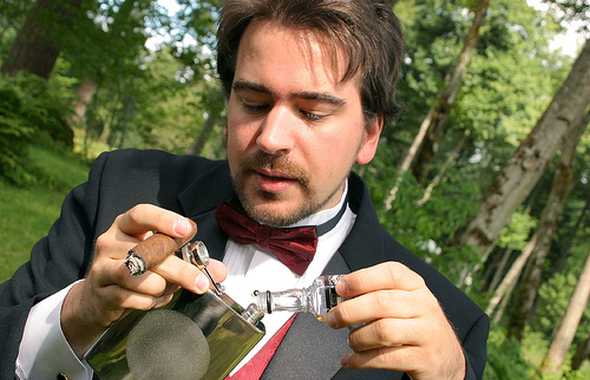In some cases, it’s extremely easy to spot an alcoholic due to their constant and obvious drunkenness.
Unfortunately, once an alcoholic is at a point that casual acquaintances can spot a problem, their lives have already been on a severe downward spiral for quite some time.
For other alcoholics, spotting their addiction isn’t so easy – most people don’t know how to spot an alcoholic who isn’t a constant drunken mess. A lot of alcoholics are good at hiding their drinking problems – even from their loved ones.


(Flickr | Scott Vandehey)
Some of these alcoholics are even successful, driven people; they belong to a sub-class of alcoholics known as high-functioning alcoholics. These are people who can balance a family and a career (at least for awhile), but abuse and are dependent on alcohol.
Here are 6 ways you can spot an alcoholic. No single factor is determinative, but a combination of many of these factors may be an indication that there is a problem.
1. They avoid social functions that don’t include alcohol
Alcoholics who are physically dependent on alcohol need to drink regularly, or they’ll experience physical withdrawal symptoms. In many cases, alcoholics may also be relying on drinking as an emotional or social crutch.

2. They sneak a drink into non-alcoholic functions
While this seems like it would be an obvious tip off, high functioning alcoholics are exceptionally good at hiding their drinking. They may be good at sneaking a swig from a hidden flask while in the bathroom, or more likely, they’ll hide their problem in plain site. They might play it off as something fun to do, or adding alcohol to “liven things up”.
3. They randomly miss work, prior commitments, and/or isolate themselves
While an alcoholic can be good at juggling their addiction and their other commitments for awhile, inevitably, their drinking bleeds into other aspects of their lives. Alcoholics will often miss work or prior commitments randomly and without prior notice, due to being drunk or hungover.
People developing an alcohol problem sometimes also start to isolate themselves from those around them, either as a side effect of depression, or to hide their disease from loved ones.
4. Risky and destructive behavior
Alcohol impairs judgment, and this eventually catches up to alcoholics. Alcoholics will put themselves into increasingly dangerous situations, such as drinking and driving, or getting into fights. As their drinking habit starts to become more central in their life, they usually start to exhibit more risky behavior.
5. They’re always on an emotional rollercoaster
Managing alcoholism is difficult, and the result is an emotional rollercoaster. The alcoholic may be fine one day, and depressed the next. They can also quickly switch from happy and easy going, to angry and aggressive.
6. They have an exceptional tolerance for alcohol
There are certainly social drinkers who have high alcohol tolerances, so this factor alone is hardly a surefire way to detect alcoholism. However, you’ll rarely meet a long term alcoholic who hasn’t built a high alcohol tolerance.
Again, its worth reiterating that many of these behaviors taken alone are not necessarily signs of alcoholism. There are also many varying degrees of alcoholism and dangerous drinking behavior. But now that you know how to identify an alcoholic, if you suspect a loved one may be struggling with alcoholism, it’s imperative that you start to take action – even if it’s just to better understand the problem. There are far too many otherwise loving family members who try to mind their own business when a loved one is struggling.
While you can’t always stop their drinking problem, you can be there to express your concern and offer your support and love.





{ 0 comments… add one now }
You must log in to post a comment.